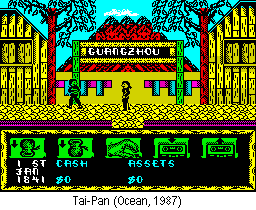|

By Lloyd Mangram
August
1987
Issue 43
|
|
Another
favourite Frey subject - Fred Astaire films. Plans for
a lavish and largely monochrome Astaire cover had been
formulated ages before but never carried out. When the
great Hollywood star died Oliver insisted on dedicating
the issue of CRASH to him, and featuring him with his
most famous partner, Ginger Rogers, on the cover. The
other elements, dancing on a newly-arrived Spectrum
+3, were the issue's lead games: Tai-Pan, Micronaut
One, Exolon and The Big Sleaze. It
was another compilation cover, a style for which Oliver
has become justifiably celebrated.
|
The Fred Astaire cover found an echo on page 63, detailing
the results of the 1987 CRASHtionnaire, where his face (and
Ginger Rogers's) appeared at the foot of a reproduced Radio
Times page. That was to illustrate the CRASHtionnaire's findings
on your TV viewing habits, but it was a good example of the
kind of detail the art department has to consider when laying
out. In recent months everyone on the team had become more
aware of the value of cross-referencing items within an issue,
and even a tiny item like the Astaire picture can add to the
enjoyment of reading a magazine.
Our big thrill (well, there were two really) was the new
Spectrum +3 with its Amstrad-style disk drive. The reviewers
weren't particularly impressed, largely because it was nothing
more than a 128K with a disk drive instead of a datacorder,
and also because there were no really good games available
on the disks yet. Simon N Goodwin wasn't raving either, though
he considered the machine professionally-made and well-documented,
because he felt you could upgrade with better disk systems
than the one Amstrad provided. Software houses were cautious
about releasing disk games for a machine which nobody had
bought yet, too, as one of CRASH's increasingly common in-depth
news features reported. And there was the price - £249
was far too high. We all suspected Amstrad of hiking it so
as not to ruin +2 high-street sales - a cynical supposition
which would be proved all too true within a few months.
The other thrill was the arrival of Hewson's Uzi pump-action
water pistols - prizes for the Exolon competition.
Naturally they had to be tried out, and anyway, we needed
photographs for the competition page. Richard, Roger, Robin
and Skippy went out dry and came back soaked. Fortunately,
as the picture showed, it was a hot day. Several innocent
bystanders got squirted, including Markie Kendrick from art.
His David Sylvian-style hairdo was ruined, so he sulked, which
resulted in the little remark from the comps minion. But we
all forgot; art always has the last laugh . . .
 Tie-ins
fared pretty badly; The Living Daylights, Challenge
Of The Gobots, Road Runner, Flash Gordon,
all did from bad to average, only Ocean's delayed Tai-Pan
- and then only on the 128 - got anywhere, and that was a
Smash. Tie-ins
fared pretty badly; The Living Daylights, Challenge
Of The Gobots, Road Runner, Flash Gordon,
all did from bad to average, only Ocean's delayed Tai-Pan
- and then only on the 128 - got anywhere, and that was a
Smash.
Meanwhile, another of those news features focused on The
Bug and its arguments with the software industry - the first
sign of CRASH's reborn interest in fanzines, that was to show
itself in a renovated Fanzine File.
During the latter part of the schedule, THE GAMES MACHINE
got under way, and Graeme Kidd got his portfolio back as its
Co-Editor. His other half turned out to be none other than
Gary Penn, who had decided that he would like to work on the
new magazine (Ciarán Brennan had taken over ZZAP!).
They set themselves up in Gravel Hill, using the offices not
long before vacated by LM. TGM - as it became known - was
going to cover more than just computers, and one of the first
articles written was a comparison of laser-tag systems. Suddenly
the water pistols had a rival as numerous different electronic
guns began to appear. It was not, of course, very conducive
to hard work in the CRASH offices to know others were zapping
each other (or 'testing') nearby, but somehow we managed to
keep our reviewers' minds on their own games.
|